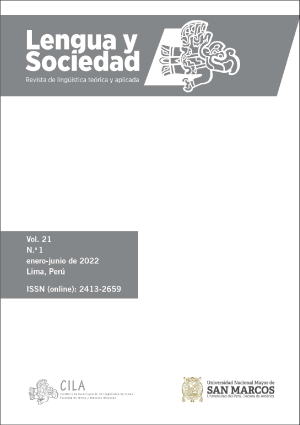Metaphors and metonymies in the presidential debate between Pedro Castillo vs. Keiko Fujimori
DOI:
https://doi.org/10.15381/lengsoc.v21i1.22470Keywords:
conceptual metaphor, conceptual metonymy, electoral debate, political discourse analysis, Peruvian electoral campaignAbstract
Two days later, Francisco Sagasti assumed the presidency and was in charge of calling elections. Thus, in May 2021, the first electoral debate was held between the candidates who represent opposing ideologies and who passed to the second round: Pedro Castillo and Keiko Fujimori. In this article, we analyze metaphorical and metonymic expressions in the political debate, under the proposal of cognitive semantics (Lakoff and Johnson, 1980; Ruiz de Mendoza and Pérez Hernández, 2001), in order to explain how politics, health, the country, education and the economy were categorized in the Peruvian electoral campaign. The results of the research show that both politicians coincide in their vision of politics as a war, but differ in the way they understand the economy, health and education.
References
Adrián, T. (2010). La metáfora conceptual en el discurso político venezolano: Rómulo Betancourt y Hugo Chávez Frías. RALED: Revista Latinoamericana de Estudios del Discurso, 10(1), 9-33. https://raled.comunidadaled.org/index.php/raled/article/view/197
Barcelona, A. (2012). La metonimia conceptual. En I. Ibarretxe y J. Valenzuela (Eds.), Lingüística cognitiva (pp. 123-146). Anthropos.
Cabrejas, A. (2018). Metonymy in Spanish and American parliamentary speeches: Obama’s State of the Union Address versus Rajoy’s State of the Nation Address. Revista de Estudios Culturales de la Universidad Jaume I, 19, 45-69. https://www.e-revistes.uji.es/index.php/clr/article/view/2814
Chavero, P. (2021). Nuevos líderes, ¿nuevos discursos? El discurso en twitter de Andrés Arauz durante la campaña electoral de Ecuador (2021). Cultura, Lenguaje y Representación, 26, 107-126. https://doi.org/10.6035/clr.5826
Cerrón, V. (2020). Perú Libre. Ideario y programa. https://perulibre.pe/wp-content/uploads/2020/03/ideario-peru-libre.pdf
Cuenca, M. y Hilferty, J. (1999). Introducción a la lingüística cognitiva. Ariel.
Cuvardic, D. (2004). La metáfora en el discurso político. Revista Reflexiones, 83(2), 61-72. https://revistas.ucr.ac.cr/index.php/reflexiones/article/view/11403
Grupo Val.Es.Co. (2014). Las unidades del discurso oral. La propuesta Val. Es. Co. de segmentación de la conversación (coloquial). Estudios de Lingüística del Español, 35(1), 13-73. https://raco.cat/index.php/Elies/article/view/285724
Kanashiro, L. (2016). Debates presidenciales televisados en el Perú (1990-2011). Una aproximación semiótica. Universidad de Lima.
Lakoff, G. y Johnson, M. (2005). Metáforas de la vida cotidiana (6.a ed.). Cátedra.
Moreno, A. (2005). La metáfora conceptual y el lenguaje político periodísticos: configuración, interacciones y niveles de descripción [Tesis doctoral, Universidad de la Rioja]. Redined. http://hdl.handle.net/11162/48256
Paúl, F. (6 de junio de 2021). Elecciones en Perú: 3 diferencias y 2 similitudes entre Keiko Fujimori y Pedro Castillo, los candidatos que luchan por la presidencia. BBC News. https://www.bbc.com/mundo/noticias-america-latina-57242721
Pérez, S. (2021). Análisis pragmalingüístico del debate electoral peruano: El caso de Fernando Olivera y Alan García. Lengua y Sociedad, 20(2), 383-404. https://doi.org/10.15381/lengsoc.v20i2.22259
Reguera, A. (2016). Metodología de la investigación lingüística. Prácticas de escritura. (2.a ed.). Editorial Brujas.
Ruiz de Mendoza, F. y Hernández, L. (2001). Metonymy and the grammar: motivation, constraints and interaction. Language & Communication, 21(4), 321-357. https://doi.org/10.1016/S0271-5309(01)00008-8
Ruiz de Mendoza, F. y Del Campo, N. (2012). La lingüística cognitiva y la pragmática. En I. Ibarretxe y J. Valenzuela (Eds.), Lingüística cognitiva (pp. 329-347). Anthropos.
Solís, N. (2020). Metáforas y metonimias de la guerra en el discurso político durante la pandemia covid-19. Lengua y Sociedad, 19(2), 129-141. https://doi.org/10.15381/lengsoc.v19i2.22309
Soriano, R. (2012). La metáfora conceptual. En I. Ibarretxe & J. Valenzuela (Eds.), Lingüística cognitiva (pp. 97-121). Anthropos.
Sperber, D. y Wilson, D. (2004). La teoría de la relevancia. Revista de Investigación Lingüística, 7, 237-286. https://revistas.um.es/ril/article/view/6691
van Dijk, T. y Rodrigo, I. (1999). Análisis del discurso social y político. Abya-Yala. https://digitalrepository.unm.edu/cgi/viewcontent.cgi?article=1414&context=abya_yala
van Dijk. T. (2005). Política, ideología y discurso. Quórum Académico, 2(2), pp. 15-47. http://www.discursos.org/oldarticles/Politica%20ideologia.pdf
Downloads
Published
Issue
Section
License
Copyright (c) 2022 Rosa Milagros Bardales Sihue, Juan Diego Berrocal Guerra, Verónica Lazo García, Margorie Sired Vargas de la Cruz

This work is licensed under a Creative Commons Attribution 4.0 International License.
AUTHORS RETAIN THEIR RIGHTS
a. Authors retain their trade mark rights and patent, and also on any process or procedure described in the article.
b. Authors can submit to the journal Lengua y Sociedad, papers disseminated as pre-print in repositories. This should be made known in the cover letter.
c. Authors retain their right to share, copy, distribute, perform and publicly communicate their article (eg, to place their article in an institutional repository or publish it in a book), with an acknowledgment of its initial publication in the journal Lengua y Sociedad.
d. Authors retain theirs right to make a subsequent publication of their work, to use the article or any part thereof (eg a compilation of his papers, lecture notes, thesis, or a book), always indicating its initial publication in the journal Lengua y Sociedad (the originator of the work, journal, volume, number and date).



























